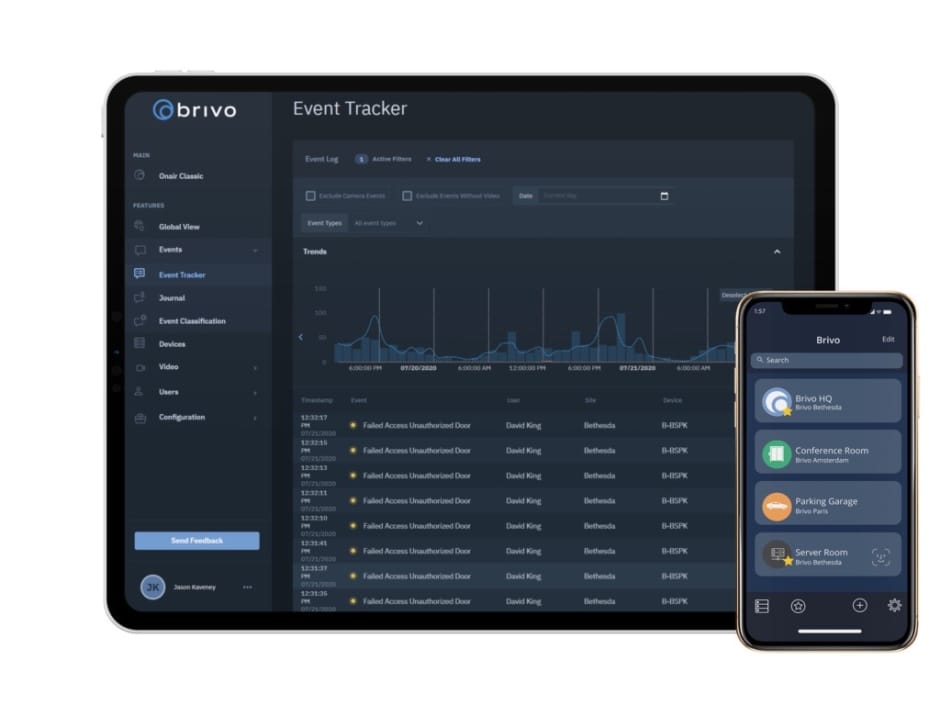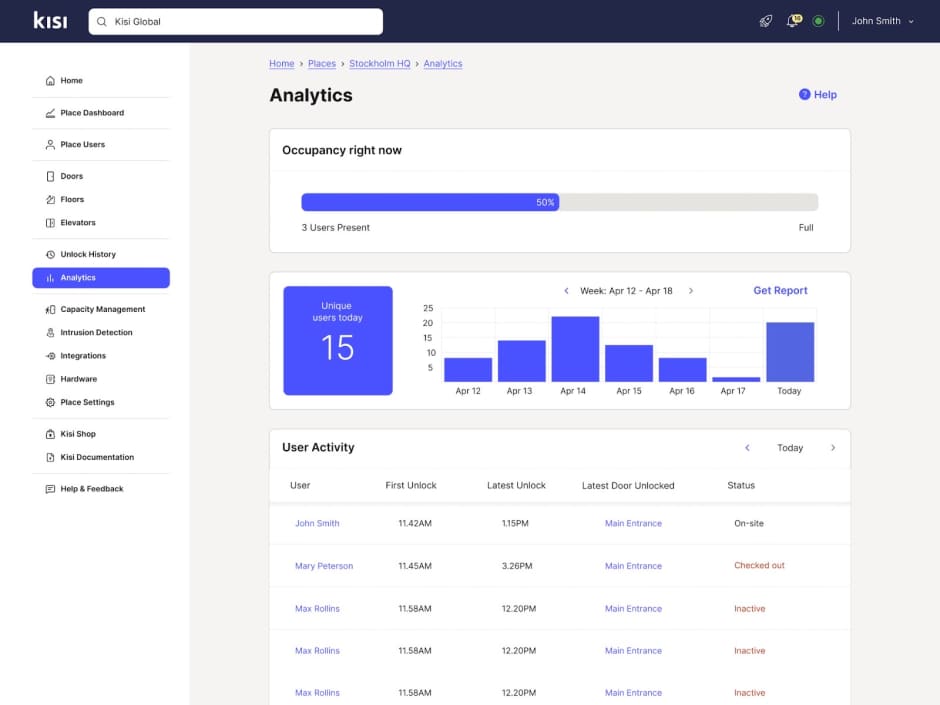Brivo product and pricing review
Founded in 1999, Brivo is a smart building company providing cloud-based access control and video surveillance products for physical security and internet of things applications. Like Kisi, Brivo provides solutions to a number of industries to enhance the security environment of their facilities. However, Kisi and Brivo have a few key differences which separate them. In this article, we will review Brivo’s offerings and highlight the main differences between Kisi and Brivo solutions.
Brivo at a glance
Brivo is a smart building company providing cloud-based access control and video surveillance products for physical security and Internet of Things applications.
- Founded: 1999
- Founder: Steve van Till, Tim Ogilvie (not active anymore)
- Number of employees: 343
- Annual revenue: $74M (2021)
- Japanese security integration company Secom invests $192M into Eagle Eye and Brivo
Key feature differences
We will highlight hardware, web UX, mobile apps, visitor access, end user experience, pricing, technology, support and industries.
Here is a quick summary of differences in enterprise grade features:
- User experience
- Kisi scores highly for user experience, as the solution is consolidated into a single app for both users and admins. Brivo app review feedback cites user friendliness as an area of improvement- their service is also spread across a few different apps.
- Quick access (links)
- Kisi allows for this functionality with temporary email links and text links for access, while Brivo does not.
- Technology and hardware
- Kisi products are manufactured in-house, while Brivo whitelabels Wavelynx.
- Support and training
- Kisi offers admin training and support, while Brivo offers this at a premium price.
- Industry fit
- Kisi offers more integrations for industries like fitness (gyms) and coworking, while Brivo offers more integrations for multi-family properties and vacation rentals.
Access control hardware
The hardware solutions offered by Kisi versus those offered by Brivo highlight the differences between the two providers. Brivo offers an access control suite that includes readers, control panels, and video surveillance.
While Kisi manufactures and designs hardware in-house, Brivo works with Wavelynx to manufacture their products. While it may not have an impact on general functionality, it does mean that they are therefore not in control of the entire platform that they use. When it comes to fine-tuning for certain use cases, this does put in place certain limitations.
Kisi products include the Reader Pro 2 and the Controller Pro 2. Like Brivo, the Kisi product ecosystem is connected to the cloud, making it easy to remotely manage the hardware solutions. Kisi products are manufactured in-house, and are produced in the USA. With the manufacturing and design completely under Kisi control, Kisi can help clients with their different use cases directly, without consulting third parties.

Web UX: Cleaner UX with more features and customization options
A key difference between Kisi and Brivo is the attention to the user experience. While Brivo offers a few different app products, their emphasis on different solution offerings results in less emphasis on intuitive and seamless user experience. Kisi has prioritized the user experience so that anyone who opens the web app or navigates to the desktop has more ways to customize their dashboard to what makes it easiest for them to manage. Read more about Kisi’s web app here.
Below is an image of the Brivo dashboard side by side with the Kisi dashboard. A few key areas to notice are the way that the Kisi dashboard admin features are easy to navigate on the sidebar, while the Brivo dashboard shows some general categories, but requires users to click through the tabs to find the features they need or groups to modify. Additionally, Kisi’s visual experience is simple and clean, without too many details so that data can be quickly and easily viewed and processed by admins. Brivo’s dashboard provides data in a format which requires some more reading, which tends to make the user experience more challenging, but generally is functional.


Mobile access app: Kisi app vs. Brivo apps
Brivo has a few different app products, each with its own intended user. Brivo Mobile Pass is for users to install to gain access to their spaces, and Brivo Access is for admins to manage their spaces. Brivo Smart Home allows users to manage the security of their residences. A common thread here when looking at the feedback is that the user friendliness and experience could be improved. Spreading their product over different app platforms also comes with the drawback of needing to onboard employees and visitors to different apps, which can take time away from the admins.
Kisi, on the other hand, is operated through the single Kisi app, which allows functionality for both users and admins. The tailored experience for both users and admins has been a focus of the design, and means the features are tailored to making Kisi is highly rated on the App Store with the score of 4.8.
Guest access: Quick access links
Brivo does not specify a way to temporarily share access with other users (e.g. guests). Instead, Brivo access admins can share a Brivo Mobile Pass with new users. This has a few drawbacks, mainly that it requires the user to download and sign up for the mobile app, which leaves little flexibility for the guest. Brivo also offers “Brivo Visitor”, an application on an iPad, where guests register themselves (in a lobby for example).
With Kisi, visitors can be issued temporary access links via email or text, making it ideal for businesses who welcome guests. With Kisi, you can issue email-based or text-based credentials with set expiry dates to provide seamless entry for visitors for an amount of time that you set, and without requiring them to download the Kisi app or create a Kisi account.
When selecting an access control solution, it’s important to consider the level of flexibility you need to accommodate guests and temporary visitors. A system that requires additional setup from both admins and users comes with additional time investment and upkeep, which may not suit your ecosystem.
Tap to unlock technology
Brivo’s unlock technology requires the user to open the app or use a button on the door, which can make entry a hassle and adds the extra step of explaining the process to visitors.
With Kisi, users don’t need to worry about multiple steps to activate tap to unlock. By simply holding your device to the reader, you can enter the space you have permissions for. MotionSense is also a feature that Kisi offers, meaning that the user can wave to the reader and enter the space, given that they are carrying their mobile, with the Kisi app installed, on their person.
Tap to unlock: Brivo vs. Kisi
Pricing
Brivo is one of the more affordable access control solutions providers - at least at first sight. With its subscription model, Brivo has the ability to offer its customers a very low entry point. However, licensing fees, data services, and administrative training, as well as other add-ons are not included, driving up the ultimate bottom line. Brivo’s price list is about 120 pages long and includes user cap, API limits, and others.
Kisi on the other hand operates on a slightly different pricing model, asking customers to pay for all the hardware products upfront and then adding an additional subscription on a per door basis.
Over time, Brivo and Kisi become aligned in terms of cost for the customer. Below we’ve included a table which highlights the pricing structures of Brivo vs. Kisi.
Apple Access with hardware
Another advantage of in-house manufacturing is the ability to integrate with services like Apple Wallet to create seamless entry for users without additional layered cost. Kisi allows for this because the products are manufactured by Kisi. However, for a service like Brivo which white-labels Wavelynx products, there is extra vendor cost when integrating Apple Access. This underlines the possible downsides of selecting a service which does not manufacture their products in-house, as it can be limiting, or associated with extra expense, in terms of future-proofing and flexibility.
Support and training
Brivo’s base price does not include onboarding services for larger or complex customers, which come at an extra premium. Onboarding is an important part of access control, as admins will need to be trained on the software and processes in order to maintain the security policy and onboard colleagues. Remote technical support and custom training services are also not included in the Brivo package, and need to be separately purchased to be received.
Kisi on the other hand might have a higher base price, but with the simplicity of including all accompanying services and onboarding for eligible companies. Moreover, Kisi experts are on hand to train and onboard admins so that organizations are trained to get the most out of the Kisi products, to help with their overall ROI.
Industries
Between Kisi and Brivo, the integrations and functionality are geared generally to a wide range of industries. However, the two solutions offer additional integrations and functionality to certain industries when compared. While Brivo has many integrations for Multi-Family properties and vacation rentals, Kisi has additional functionally and integrations for gyms, and coworking spaces.
For larger, enterprise customers, there are a few things to consider with Brivo’s model in terms of pricing. Likely, enterprise customers would end up met with high add-on costs to support their facilities, as Brivo operates on a model wherein there is a lower entry cost, but higher costs as additional services are added to the plan. In this case, it can be beneficial to choose a solution which is more-service inclusive, as it can be difficult to continually reassess costs for the access control solution needed. Add-ons also require consideration of each feature, which can be time-consuming for an organization to consider, as each add-on would require allocating funds, and discussions would be needed to determine the level of need for that feature. This can be less than scalable for larger organizations.
Conclusion
Both Kisi and Brivo offer solutions that allow organizations to remotely manage access. The cloud-based systems that Kisi and Brivo offer are highly scalable and allow for facilities to future-proof their solutions.
Brivo competitors & alternatives
Research alternative solution to Brivo, a physical security software with mobile access and cloud management. Factors when researching alternatives to Brivo include innovativeness and ease of use. We created a list of vendors that are popular with online communities and overall best alternatives and competitors to Brivo including Kisi, Salto, ADT, Verkada and Aviglion.
Alternatives to Brivo are other cloud based solutions including:
